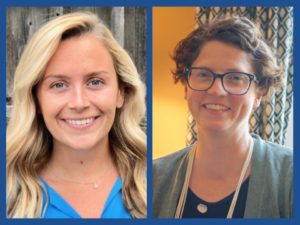By Lauren Murphy and Kaia Cunningham
October 27, 2022
Collectively, we have over 20 years of experience teaching secondary school, and we’ve taught a variety of classes: literature, psychology, history, writing, and study skills. This year is unprecedented. We find ourselves filled with apprehension, and much of the familiarity and routine that we have both come to love in our many years in the classroom have been turned on their heads. We feel this uncertainty most keenly in helping our students manage the massive language demands inherent in organizing, understanding, and using a learning management system (LMS), such as Blackboard, Canvas, or Google Classroom. Landmark High School is following a remote/hybrid model this year. We hold in-person classes every day; however, any student who lives too far away or can’t physically attend classes can join remotely. This means that most of our lessons have a digital focus, and it also means that navigating the LMS, which has now become our primary means of sharing class materials and assignments, takes center-stage in our daily instruction.
Although our classrooms look different, the language demands placed on students are still very present, and we are finding that there are actually more language demands in this new landscape. Remote and hybrid learning requires the use of a LMS. Subsequently, when students run into trouble or become confused or overwhelmed, they must use metacognition, or their ability to think about their own thinking, to untangle themselves. They must think about what they know, what they don’t understand, and what they want to do about it. It is also important to note that for a student to engage in this process, they must have enough memory available to do so.
Imagine a 9th grader with decoding and comprehension difficulty. To acquire the necessary class materials remotely and gain entry to the digital classroom, she must read directions and then follow many steps to access what she needs and to get where she needs to go. More often than not, these directions are written, and, particularly in a secondary school setting, there can be variability across classes in how students access classes and materials. Reading and following directions taxes her memory, which is further overloaded by inconsistencies in how to obtain what she needs-.0. Add a high level of stress from living through a pandemic, and it is no wonder we are seeing students routinely give up and shut down.
Even though the standard expectation is for high school students to independently navigate the digital world, we have found in the weeks we’ve been back in the classroom that our students, even our most digitally savvy ones, are struggling to easily find their way around these new online spaces. Is their classwork located on the LMS or in a digital folder? Are they connecting via Zoom or Google Meet? Where do they turn in their work? Are their documents uploaded correctly? Are they shared with the right teacher?
With these challenges in mind, what we find to be the most effective strategy is simply to be consistent. Students need our support to figure out whatever LMS is being used, and if we can help reduce the cognitive overload in trying to navigate these systems, we can hopefully free up memory so that students will have space to engage in other parts of learning.
 Lauren Murphy has taught a variety of study skills and writing courses since she came to Landmark High School in 2014. In addition, she helps with logistics both behind the scenes and at the registration table for the Outreach Summer Institute. Lauren also coordinates email marketing campaigns and social media for all aspects of the program. She holds a bachelor’s degree in psychology from St. Lawrence University, and a master’s degree in special education from Simmons University.
Lauren Murphy has taught a variety of study skills and writing courses since she came to Landmark High School in 2014. In addition, she helps with logistics both behind the scenes and at the registration table for the Outreach Summer Institute. Lauren also coordinates email marketing campaigns and social media for all aspects of the program. She holds a bachelor’s degree in psychology from St. Lawrence University, and a master’s degree in special education from Simmons University.
Kaia Cunningham has been at Landmark since 2006. In addition to her work for Outreach, she has been a language arts teacher at Landmark High School. Previously, her roles and responsibilities included assistant director of the preparatory program, academic advisor, and full-time teacher and tutor. Kaia graduated from The College of Santa Fe with her bachelor’s in English, and she earned her master’s degree in special education from Simmons University.